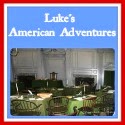In the spring of 1865, the American Civil War was nearing its end, and the Union stood on the brink of victory. Union General Ulysses S. Grant was driving Confederate General Robert E. Lee back toward Richmond, Virginia. Union General William T. Sherman had cut through Georgia to the sea, obliterating everything not of use to the army along the way. On March 4, 1865, President Abraham Lincoln was sworn into a second term. In his second Inaugural Speech, he sought to explain the meaning of the war and to establish a basis for restoring the United States. At a time when Union victory was within days of reaching and slavery was near an end, the newly re-elected President did not speak of triumph, but of sadness.
He begins:
Lincoln was very cognizant of the power vested in him. In his speech “A House Divided,” he acknowledged that a decision for the nation would have to be made, and reiterated in his first inaugural address that a
war was not his decision - if there was to be war, that was the People’s choice. He used the powers given to him by the People to issue the
Emancipation Proclamation, and dedicated the fields of Gettysburg that
“a new nation...of the people, by the people, for the people, shall not
perish from the earth.” Here, in his second inaugural speech, only
slightly longer than the Gettysburg Address, he again places the focus
on the People.
Lincoln then used his Address to touch on the question of Divine providence. He often wondered what God's will might have been in allowing the war to come, and why it had assumed the terrible form it had taken. More than half a million men were dead, and the fighting was still going. In the popular mind, both sides of the Civil War assumed that they could read God's will and acquire His favor in their opposing causes. Lincoln believed that war was the people’s doing, not God’s. He couldn’t imagine God would condone slavery, yet he could not resolve himself to the idea that it was only through overwhelming death and destruction that it would be abolished:
The popular sentiment of the time was “Right is might,” and those who won had God on their side. But while slavery would eventually be outlawed, there were few “winners” in war. The war had taken a toll on both sides, with families torn apart and the nation in tatters.
However, Lincoln also believed that it was never too late to begin anew. He felt a better use of God’s benevolence would be to ask for His aid in bringing peace to the land. Rather than singling out any given group, he instead asks all good people to work together to unite the country and help those who suffered during the past troubles. While Lincoln believed all men, regardless of race, were equal, he stressed it was not his duty to shun those who had differing opinion. His intent is to begin the process of achieving peace for all. If war was declared by the people, then could not peace be brokered by the people? He concludes his speech with these words of reconciliation:
Lincoln asks the people again to be the nation they were meant to be; it was time to put the nation back together. The majority had spoken - the Union had overtaken the Confederacy, and an inevitable surrender would come at Appomattox a month later. However, this great leader of the people did not know that he would not live to finish the peace-making his term had begun; in just over a month, the people of his battered yet beloved nation would mourn his death.
Abraham Lincoln Speaks:
Part 1: A House Divided
Part 2: The President's Job Description
Part 3: Liberty for All?
Part 4: A New Birth of Freedom
Part 5: With Malice Toward None
Part 6: Now He Belongs to the Ages
©2012- 2014 Adventures with Jude. All rights reserved. All text, photographs, artwork, and other content may not be reproduced or transmitted in any form without the written consent of the author. http://adventureswithjude.com







No comments:
Post a Comment